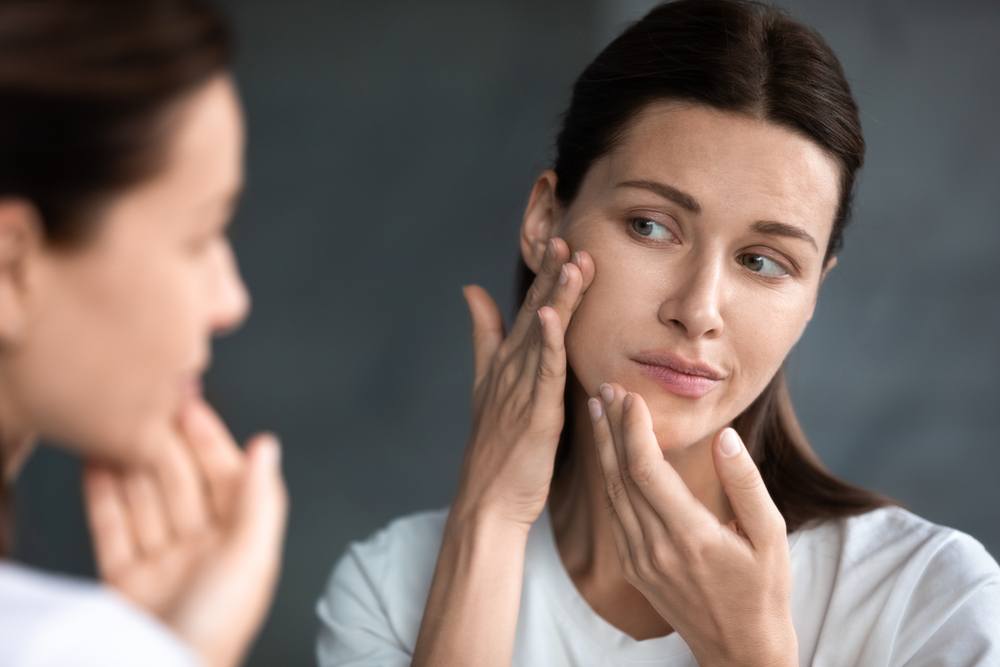
Beyond Looks: The Connection Between Skin Complexion and Health
TL;DR:
- • Skin reflects overall health; changes can signal internal imbalances.
- • Dry skin may stem from improper products, environment, or underlying conditions.
- • Oily skin can be linked to genetics, hormones, diet, and skincare habits.
- • Stress triggers skin issues like rashes, eczema, and acne.
- • Mental health impacts skin; skincare can be a form of self-care.
Your skin complexion isn’t just about looks—it can reveal a lot about your health. Dryness, oiliness, or unexpected breakouts often signal what’s happening inside your body. Factors like hydration, diet, stress, and skincare habits all play a role in how your skin looks and feels.
In this guide, we’ll break down the connection between skin and overall well-being and how you can keep it looking and feeling its best.
What Your Skin Complexion Says About Your Health
Changes in skin complexion, whether it’s dullness, redness, or unexpected breakouts, can signal everything from dehydration to hormonal shifts.
- • Dull or Uneven Skin: Not drinking enough water, eating poorly, or skimping on sleep can leave your skin looking tired. Staying hydrated and eating nutrient-rich foods can help bring back your glow.
- • Persistent Dryness: If your skin stays dry no matter how much you moisturize, it could be due to harsh skincare products, dry air, or even conditions like eczema or hypothyroidism.
- • Oily Skin: Wondering what causes oily skin? It’s usually linked to hormones, stress, or even over-washing, which can make your skin produce more oil to compensate.
- • Redness or Inflammation: Skin that’s constantly red or irritated might be reacting to allergies, rosacea, or even digestive issues. A gentle skincare routine and an anti-inflammatory diet can help.
Your skin’s appearance is often a reflection of your overall health. Paying attention to these signs and making small changes to your routine can help keep your skin looking and feeling its best.
Why Is My Skin So Dry Even When I Moisturize?
If you’re slathering on moisturizer but your skin still feels tight, flaky, or rough, you’re not alone. Dry skin can be stubborn, and sometimes, hydration issues go beyond just applying lotion. Here are a few common reasons why your skin might still be parched:
- • You're Using the Wrong Moisturizer: Not all moisturizers work the same. If yours isn’t sealing in hydration, try one with ingredients like hyaluronic acid, glycerin, or ceramides.
- • Overwashing or Hot Showers: Washing your face too often or using hot water can strip away natural oils, making dryness worse. Stick to lukewarm water and a gentle cleanser.
- • Harsh Skincare Products: Alcohol-based toners, strong exfoliants, or foaming cleansers can dry out your skin. If your routine includes these, consider switching to more hydrating options.
- • Dehydration and Diet: Moisturizing starts from the inside. If you’re not drinking enough water or eating nutrient-rich foods, your skin won’t get the hydration it needs.
- • Weather and Environment: Cold, dry air or indoor heating can pull moisture from your skin. Using a humidifier and applying moisturizer while your skin is damp can help lock in hydration.
- • Underlying Conditions: If your dryness is persistent despite all efforts, conditions like eczema, psoriasis, or hypothyroidism could be at play. A dermatologist can help pinpoint the cause.
What Causes Oily Skin?
Managing oily skin isn’t about eliminating oil completely—it’s about balancing it. While some oil is necessary to keep your skin healthy, too much can lead to clogged pores and breakouts. Here are some common culprits behind excess oil production:
- • Genetics: If your family has oily skin, chances are you do too. Some people naturally produce more sebum (oil) than others.
- • Hormones: Fluctuations in hormones, especially during puberty, pregnancy, or menstruation, can trigger oil production. This is why breakouts often coincide with hormonal shifts.
- • Overwashing or Harsh Cleansers: Scrubbing your face too much or using strong cleansers can strip your skin of its natural oils. In response, your skin may produce even more oil to compensate.
- • Wrong Skincare Products: Heavy creams or pore-clogging ingredients can make oily skin worse. Opt for lightweight, oil-free moisturizers and non-comedogenic products.
- • Diet and Hydration: A diet high in processed foods or dairy may contribute to excess oil production. On the flip side, not drinking enough water can make your skin overcompensate by producing more oil.
- • Climate and Environment: Hot, humid weather can make your skin produce more oil, while air pollution can contribute to clogged pores and breakouts.

Can Stress Cause Skin Rash?
Yes, stress can show up on your skin, including in the form of rashes.
When you're under pressure, your body releases cortisol and other stress hormones, which can trigger inflammation and weaken your skin’s protective barrier. This makes your skin more reactive and prone to irritation.
Here’s how stress can lead to rashes and other skin issues:
- • Hives and Red Patches: Stress can cause histamine levels to rise, leading to itchy, red welts that look like an allergic reaction.
- • Eczema Flare-Ups: If you already have eczema, stress can make it worse, causing dry, itchy, inflamed patches to spread.
- • Psoriasis and Rosacea Triggers: Stress is a known trigger for conditions like psoriasis and rosacea, making flare-ups more frequent and severe.
- • Acne and Breakouts: While not exactly a rash, stress can increase oil production and inflammation, leading to stubborn breakouts.
How to Prevent Stress-Related Skin Issues
- • Practice relaxation techniques
- • Get enough sleep
- • Use gentle skincare
- • Stay hydrated and eat well
If you notice rashes or skin irritation during stressful times, your body might be telling you to slow down. Managing stress not only benefits your mental health but also helps keep your skin calm and clear.
Mental Health and Skincare
When your mental health is struggling, your skin often follows. Here’s how mental health can affect your skin:
- • Increased Breakouts: Stress and anxiety trigger cortisol, which can boost oil production and cause breakouts.
- • Sensitive or Irritated Skin: Depression and high stress levels can weaken your skin barrier, making it more prone to redness, dryness, and irritation.
- • Slower Healing: When you're overwhelmed, your body’s ability to repair itself slows down, meaning acne, rashes, and other skin issues take longer to heal.
- • Skin-Picking Habits: Conditions like anxiety or OCD can lead to habits like picking at your skin, which can cause scarring and worsen breakouts.
While skincare alone isn’t a cure for mental health struggles, it can be a simple, soothing way to take care of yourself.
- • Stick to a Routine: Even a basic skincare routine can provide a sense of structure and normalcy.
- • Choose Soothing Ingredients: Look for calming ingredients like chamomile, aloe vera, and niacinamide to reduce inflammation and irritation.
- • Practice Stress Management: Meditation, journaling, or even deep breathing can help lower stress hormones and keep your skin in check.
Take Control of Your Health & Skin
Whether you're dealing with dryness, oiliness, or stress-related breakouts, understanding the connection between your skin and health can help you make better skincare choices.
If you’re looking for expert care to keep your skin healthy and glowing, Flirt Cosmetics offers professional treatments tailored to your needs. Discover the best skin treatments today and give your skin the care it deserves!
